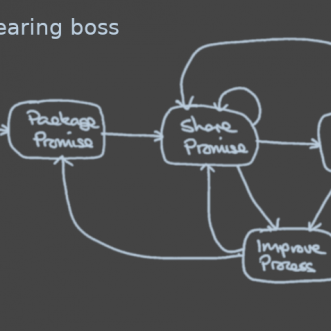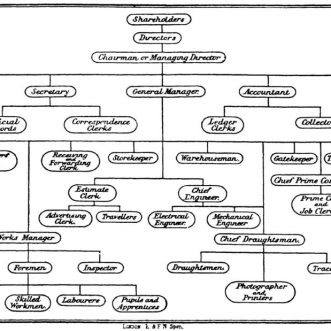
Handing over your baby
One of the things that can prevent impact-driven small-business employers from scaling as fast as they would like, is a … Read More “Handing over your baby”

One of the things that can prevent impact-driven small-business employers from scaling as fast as they would like, is a … Read More “Handing over your baby”

Someone asked an interesting question on James O’Brien’s Mystery Hour phone-in yesterday. It went something like this: “Why do orchestral … Read More “Why have a score in front of you?”

In business, our view of succession is not unlike that of royals. An heir apparent is selected, carefully trained, and groomed to take the helm when we leave.
This approach is fraught with difficulties.
First, as regnant monarch, we put off the selection, training and all that, because we’d rather not face our own mortality, and because to do all that takes time out from running the business.
Next, the heir we select may not wish to be chosen – even if they are family. They may not wish to shoulder the risk of destroying their inheritance. They may have other ideas on what to do with their life.
The people we’ve overlooked may resent that, and start to at least detach themselves from the business, or undermine it, or worse decide to fight over it.
Finally, there may not be an obvious heir.
There is a more rational, modern approach.
Built this way, a business more or less runs itself.
It gives you far more options for succession, because anyone who works in it can be your heir, if they want.
Or everyone.
A transition from dictatorship to democracy in a single generation.
That would be a legacy to be really proud of.
Discipline makes Daring possible.

One day, the child in this photograph might expect to inherit her parents’ motorbike.
She couldn’t expect to use it until she’d learned to drive it safely, keep it in good order and register it with the appropriate authorities. If that seems like too much trouble, she might very well sell it, run it into the ground, or simply leave it to rust.
Handing over your business to your employees (or your children for that matter) isn’t enough to ensure that it will thrive afterwards. Transferring ownership transfers power, but not the ability to use that power responsibly.
Of course your people might have that ability already, but if you’re the boss of a 5 or 10 person business, it’s unlikely that you or they know that conclusively.
After the sale is almost too late to find that out. You’re not the boss any more.
So, if you’re planning to go employee-owned, or to pass your business on to your children, make sure they know how to run it before they take ownership.
This takes effort, but not as much as you might think. Like most things, the sooner you start, the better. But you could do it while the legalities of transfer are being worked out, or even include it as part of the transfer process.
The upside is you’ll have something even more worth handing over, and for all the new bosses, the ability to truly cherish it as your legacy.
Discipline makes Daring possible.

I think quite a lot about ‘Muri’ – wasted effort due to overburdening or stressing people, equipment or systems.
It’s the Cinderella of waste, mostly ignored by management consultants and gurus. Perhaps because it exposes the dark heart of capitalism. The more you sweat your ‘assets’, the more money you make. Who cares if you break them along the way, as long as your pile ends up big enough for you to move on and do it again?
Things are different inside small employer businesses – at least the ones I know.
There, the ‘assets’ most likely to be subjected to Muri are owners. They are the ones who take up all the slack. Who ‘go the extra mile’, ‘give 110%’, ‘do whatever it takes’ to keep the promises they’ve made.
Not because they’re aiming for burnout, but because they haven’t yet realised that if they share the work effectively with their team, nobody needs to overwork themselves.
‘Sharing the work effectively with your team’ is easier said than done, and easier done than you imagine, when you visualise your business operations as a musical score, and your team as an orchestra performing it over an over agin, getting better all the time.
Putting this in place could be the ultimate exercise in self care – for you, your business and your team.
And everyone will thrive as a result.
Discipline makes Daring possible.

Here are 9 negative reasons why you might want to disappear from your business:
– You fall ill.
– Your partner falls ill.
– Another family member falls ill.
– You get run over by a bus.
– Your partner gets run over by a bus.
– You burn out.
– Your parents need care.
– You have to move house.
– You have to move country.
And here are 3 very positive reasons why you should disappear before you need to:
– You want your business to make a bigger impact now. Serve more customers, better, support more people working in it, and make that work more meaningful and fulfilling for them.
– You want your business to become an asset, not a job. The source of your pension, an income for your family, an income stream for your next venture. To sell it for more money.
– You want your business to take on a life of its own. To become your legacy, continuing to make an impact long after you’ve gone.
Bonus:
– You are still able to do whatever you need to do.
– Your business can continue to support you while you’re away.
– You have a business to come back to if you wish.
A modest amount of Discipline when you’re a team of 3 to 9 people, makes all this Daring possible. More quickly than you think.

If you want maximise your chances of selling your house, you have to de-clutter and tidy it up. Obviously. It pays to make sure it’s in good repair too.
But in order to make it as attractive as possible to as wide a range of buyers as possible, you may well have to re-decorate and re-style it too.
To show off its potential.
To take the ‘you-ness’ out of it.
To make it look like you’ve already left.
The advice for selling a business is similar. De-clutter, tidy-up, make sure it’s profitable, show it has growth potential, take you out of it. Make it look like you’ve already left. Go corporate.
But what if it’s you that makes your business amazing? What if that’s what keeps your clientele coming back? What if that’s what drives the recurring revenue?
My advice?
By all means take you out of the business, but keep the ‘you-ness’ in.
Go further, embed your ‘you-ness’ into the business so firmly that only like-minded people would want to buy it. They’d love it so much they’d pay extra for the ‘you-ness’, because for them it’s also ‘me-ness’.
Become a Disappearing Boss. Build the ‘you-ness’ (actually the ‘we-ness’) into the fabric of the business, into the way it works, so that it can never ‘go corporate’. Not even as it grows.
Go even further, don’t sell at all. Let it instead. To people who love it the way it is and can see how to take that unique potential forward as your legacy and theirs. Who will want to keep it in good condition, and even replicate its success in other locations.
By then, you’ll have those people in your business already. They will have helped you build it.
Discipline makes Daring possible

It’s a classic story of how many small businesses grow, and then shrink again.
As the founder, you do everything. You do the sales and marketing to get clients, you enrol them, and you deliver the service to them once they’re on board. Gradually you refine your hand-crafted offer into a customer experience that is uniquely yours. That most of your clients really love. That you become known for, even though you aren’t the only person or business offering this service.
So you decide to scale up. You add other people – employees, or just as often, specialist freelancers – to help you with delivery. So you can service more clients.
Handing over means systemising the parts of the process other people can do for you, but you retain control of the parts that matter – where the process interfaces with clients. The heart of the customer experience. After all, you are the face of the business. People buy people, and that means you.
At first this is great. You can handle more clients than before, make more profit than before. So you take on more collaborators.
But all too soon, it becomes too much. Suddenly you are working harder than anyone else. You feel obliged to keep your collaborators fully occupied, but that means overloading the backbone – you.
You can’t take holidays, you can barely take weekends. And when you do snatch a break, either it gets interrupted by collaborators or clients, or you come back to extra work. Because nobody else can fulfill your role.
So back down you shrink. Not quite to the one-man band you started as, but to essentially a one-man band with specialist accompaniments, dealing with a limited number of lucky clients each year.
In principle, there is nothing wrong with this. Of course not. It’s your life, your business, you decide how you want to live it.
But if you dream of making a bigger impact, you might like to know there is another way. That doesn’t involve ‘going corporate’. That doesn’t mean building a machine, losing the personal feel of your business completely.
The choice isn’t between 3 people and 300. Between being a freelancer or being a tycoon. Between being human and being corporate.
It’s possible to systemise your personality, your values, your unique customer experience into a small business that can scale without losing its humanity. And without killing you in the process.
You just have to go about it in a different way.
By building your business as a system for making and keeping promises to the people you serve. A system run by and for humans, not machines. A system that enables everyone to be a Boss, so that any one of you can take a break when you need to.
Luckily for you, I’ve worked out how to do this over a year-long programme. My clients have reaped the rewards.
It’s called The Disappearing Boss.
And from September you’ll be able to do it yourself, as part of The Disappearing Bosses Club.
Discipline makes Daring possible.

During that tiger-riding phase of growing your business, when you’re growing fast, when new opportunities are coming at you thick and fast, and it feels right to take as many of them as you can; it can feel like everything is out of control. It can feel like nothing is working as it should, so you have to be everywhere, supervising everything, checking everything, or the tiger will run away with you.
You might think that this would be the worst time to start writing down your Customer Experience Score.
You’d be wrong.
Because, by giving yourself space to get your music out of your head, you also give yourself space to think about how ‘doing things right’ can be made easier to achieve. Sometimes ridiculously so, with a ridiculously simple change, such as creating a Prop for others to use that literally helps them see through your eyes.
Because, as you write down what till now has only been playing inside your head, you see how the part you wrote for the violins is very close to what the violas will need, and the oboes, and with a few more tweaks, the clarinets. Suddenly, the job of getting it all down is much smaller than you thought.
And because, as you write the first few parts, and see how easy it is to get your Orchestra to play them beautifully, even when you’re not in the room, you realise that the next part you write is likely to work just as well, and the one after that, and the one after that. Suddenly, the job of getting it all down is far less urgent than you thought.
And so you realise that you can loosen your hold. That the tiger isn’t going to run away with you. That you can spend time building her a generous and beuatiful reserve in which she can flourish.
You’ll never be done of course, but now you know how easy it is, you can enlist your team to help you.
And once they know as much as you do about how your business should work to make and keep its promises to customers, you can step back and enjoy watching your tiger become a streak.
Discipline makes Daring possible.
It also makes it easier.

When I was in infant school, I used to play with my friends. We’d pretend to be characters in a story, then play-act the story, making it up as we went along. We’d decide who was going to be who, then start with a scenario from our story. We never knew how the story was going to end, or even where it would go next. We’d discuss that between ourselves as we play-acted – ‘what if you do this, then I’ll do this, and she can do that’. We always agreed on something mutually satisfying to all parties, and so ended up with a very satisfying play, that would often extend over multiple playtimes.
We played other, more formal games too – skipping – with two people turning the rope, and everyone taking a turn to jump in and do tricks; or French skipping, where we each took turns to make a kind of cat’s cradle out elastic held taut between two people’s ankles.
Whether though consultation and improvisation, or by using a shared set of rules, we collaborated to produce a shared outcome we were all happy with.
What we didn’t realise, couldn’t realise at that age, was that what we were actually doing was getting each other to do what needed doing.
In other words, management.
Nowadays we tend to think of management as a mostly top-down affair. Imposed in the belief that people a) won’t work unless they’re made to, and b) need to be surveilled to make sure they do. “Getting [other] people to do what needs doing”.
That’s a very 18th century view, based on a fundamental and very apparent asymmetry of power.
The asymmetry is still there, but many organisations have found more equitable ways to get people to do what needs to be done:

And seems that the further to the right, the better the performance as a whole. Although most organisations I’ve worked in, have barely made it past a ‘participative’ style.
Personally, I think this diagram should look more like this:

Which is why The Disappearing Boss is actually about making everyone a Boss.
But then, I never did like games where someone was ‘in charge’.
Not even when it was meant to be me.
Discipline makes Daring possible.
HT to Seth Godin for the prompt.